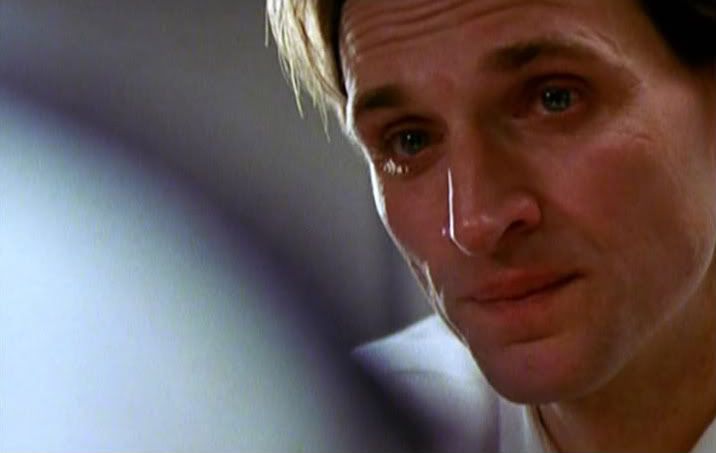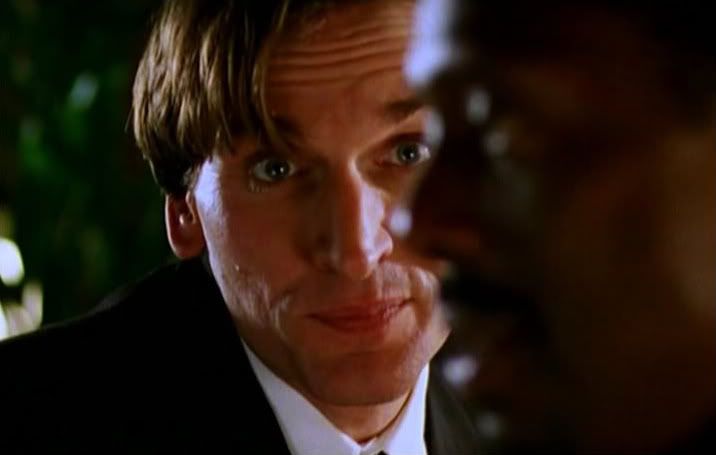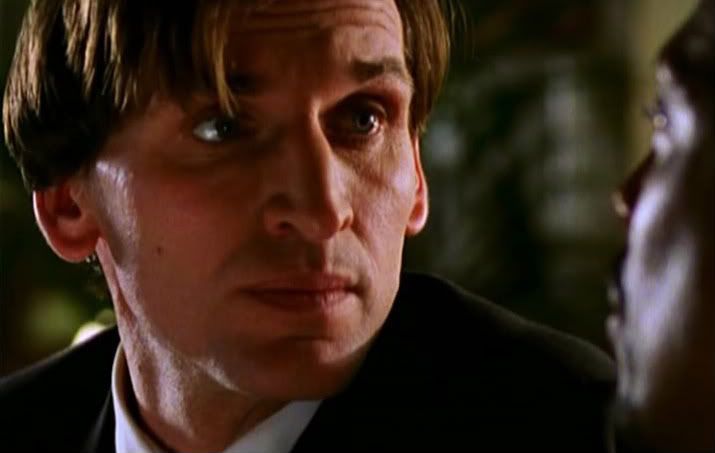 Let's start Volume Two with a film that is somewhat sporadically available, but the effort to trace it is well worth it. Arguably, one of the best villains hails from
Let's start Volume Two with a film that is somewhat sporadically available, but the effort to trace it is well worth it. Arguably, one of the best villains hails fromOthello
Shown in 2001, TV film, directed by Geoffrey Sax, Andrew Davies' modern take on William Shakespeare's tragedy.
Christopher Eccleston plays the character of Iago, here Ben Jago (a role he'd been offered once by The Royal Shakespeare Company, but had to decline due to other commitments).
In the film, the action is transplanted from historical Venice to current-day London, where two high-rank policemen's, John Othello and Ben Jago's paths clash spectacularly on the board of political games.
In a 2001 pre-première interview with Marion McMullen Eccleston commented on Jago: "I think there is a malign and destructive side to all of us, but by and large we keep it under control." [on what drives Ben Jago] "I wanted it to be a compulsion to destroy, because he's not entirely sure why he does it. He is incapable of intimacy which makes him invulnerable. He has great control over himself, but also absolutely no control either - he's completely contradictory. I wanted the audience to look for regret, but see none."
Ben Jago shuns no means digging a wolftrap for his 'frenemy' and suddenly his superior Othello, the first black commissioner of the Metropolitan Police. Aside from pulling various threads inside the institution, Jago, not unlike the politicians behind the castling in the force, uses the race card. While his so-non-PC rant, reacting to the news, could be discounted as mere enraged raving - and is indeed qualified soon after by Jago himself as a 'passionate performance', there's little ambiguity for example around him networking online, throwing biscuits to white supremacists.
In the Production Notes (based on the same session of interviews as above) screenwriter Davies comments that "Jago discovers he does have racial feelings after all" first when he's wronged by Othello's promotion. Eccleston disagrees: "I don't think Jago is a racist. I think it's much more likely that he is a man thwarted in love. Othello's love for Dessie adds as much fuel to his hatred as does the colour of Othello's skin. I think he's seen white men whip themselves into a frenzy about their hatred for black people and he uses that on himself and on us. But I don't think it is the deciding thing ... Jago's too bright to be a racist."
Where do you find yourself in this discussion?



8 comments:
I find myself in the middle, I think. I do have the impression that Jago has some racist feelings, although he believes that he is too bright to have any racist feelings.
I definitely agrees with Christopher Eccleston about the jealousy and envy Jago feels: not only does Othello have his dream job, he also has emotional intimacy with someone, a love which Jago has probably never had (despite his "I've been there, I understand" comments). I'm always slightly unsure, every time I see this movie, if Jago is envious of their relationship, or jealous that his closest friend loves someone so intensely. There are homoerotic touches in the film (Jago is very touchy-feely with Othello, seductive on several levels) that add ambiguity to CE's statement about love.
However, I think that Jago, like many white people who believe that they are unprejudiced, carries inside him a heritage of racist feelings, coming from previous, less politically correct generations. It used to be socially acceptable, not that long ago, to talk about blackies and wogs and make coments about how Africans are lazy and incapable of sorting themselves out without the help of white people. Jago's parents would have been in that generation, so it would be something he'd have grown up with and that he's still carrying within him today.
I don't think Jago realises that he has racist feelings, but racism surges up, all those nasty things he heard about black people find their way out of his mouth and even if he doesn't "mean" them or believe them to be true, they are definitely present in the back of his mind.
Suppose the question is, whether the story would be different, if Othello _weren't_ black?
I completely agree about the 'inherited' racism - but I think it's used 100% instrumentally by Jago, like he uses sex, or staged emotions to exploit people's despondency and desperation. Racism is simply convenient - these angry people through their blinding fervour make themselves vulnerable to manipulation. And Jago is the master of that.
And as such, he cannot even imagine he could be trumped. His own weakness is his passion for control - which has to be maintained to preserve the effect. And that makes him the loosing side. Hence, jealousy of, basically, the very possibility of non-engineered feeling; he's been unable to eradicate that need - he's much more successful in eliminating everyone he touches.
At the degree which Jago has reached, I'd say he's beyond race and gender. All the talk of Love: He's on the theoretical level, which could be a poetic reflection like the source of this story, but making it functional has made it barren.
My initial impression when watching this film was that Jago was just using racism to stir the pot against Othello. I felt he would have used homophobia if Othello had been gay, misogyny if Othello had been a woman, etc. I saw Jago as that kind of sociopath who is convinced of his superiority over every one.
In fact, it seemed to me that he actually was more contemptuous of the previous commissioner than he was of Othello. His respect and love for Othello would have probably remained intact if he had got the job he felt he deserved.
I think that the notion of "inherited" racism is a very interesting one and it certainly could be that coming through in the scene where he rages through the halls of the police station. Nice observation.
Also, just had to say, this is one of my favorite Eccleston roles. He is so seductive and compelling even while you are being repelled by his actions - very much the way I see Iago in the original. So much misused power in the character - which to me is as much of the tragedy as all of the deaths.
Thanks for the topic - I keep meaning to delurk to join in, just been busy lately and haven't been able to spend time formulating my thoughts.
Jay P
That's exactly my thoughts, just expressed much more clearly.
My impression is the same, that Jago is not against Othello as a person; also, in a way, Othello ceases to be a person for him.
It's a great role. High voltage.
Thanks for delurking, Jay P, and you're more than welcome to comment on any of the previous topics when you find a free minute.
Good comments, lively discussion. This performance has always been one of my Eccleston faves, for reasons Jay P mentioned. CE is rarely drawn to roles where charisma is a major factor, and in this role as politician who happens to be a policeman he gets to play that, along with the trademark intensity. I don't believe Jago is racist, but as politician knew exactly how to play the race card, as we say in the states. That was just one of the elements of his plan-the other being exploiting his friends love and jealousy.
Neptunienne's point about heritage of racist feelings is interesting-particularly viewed in the context of police forces, where that could still be an underlying factor no one would acknowledge. I do find myself kind of unable to explore it fully right now given the level of racist discourse in my country the past week. I literally heard a caller call into a liberal talk radio show and declare that President Obama is trying to ruin the middle class in America (the health care bill among other things) as "retaliation for slavery" I was driving and almost drove off the road when I heard that. The caller then went on the litany of he is a muslim, he wasn't really born in the US, etc etc that the right wing is spewing these days (ironically whipping up the racist base for completely different gain-not so dissimiliar to Jago then?)
For any Americans who haven't seen it, this film is available for rental from NetFlix, and for purchase at various places like Amazon.
I agree that if Othello weren't black, Jago would have found some other perceived "weakness" to exploit. But I also agree with Neptunienne that "They Have To Be Carefully Taught," as the old song goes. Bigotry is more the result of programming than ignorance. Jago immediately wields the bludgeon of racism, which leads me to believe he had it to hand all along. And a sad human fact is that nobody, alas, is "too bright to be a racist."
Still, I think the "thwarted in love" motivation makes sense, at least for Ben Jago. He's clearly not sincerely emotionally engaged with anyone-- his scandal-wrecked commander, Lulu, the remorseful young policeman, the two ex-wives who "couldn't be bothered to make" Dundee cake for him. He sees Othello's sudden, intense passion for Dessie as Othello's greatest weakness, so it's where he applies the greatest pressure. At the very least, Jago has to be deeply cynical about love and loyalty, to exploit them as he does.
Yep, and for non-Americans import is alright, because it's an all-regions.
Suppose Jago has similar _skills_ for all occasions, sort of 'name that tune' fashion.
"Too bright to be a racist" now, I don't think he meant that some are above that, only that if you're an intelligent, educated individual you're likely to be more lucid about it.
Being bright, of course and unfortunately, doesn't exclude racist feelings, but probably it's more scary when one uses hatred technically than when one is _just_ a ringleader.
The same cynicism, both regarding the positive and the negative emotions and leanings.
(That scene in Jago's kitchen, double-dyed villain with a weakness for cake...)
And thinking about the end, 'safe hands', in a way, it's not bigotry and racism, but that very manipulatory cynicism in power that's scariest.
I find Jago a jealous character. A bridesmaid never a bride and who craves power and would not stop at anything to influence and manipulate those around to get what he wants.
I've never found Jago racist but like Brutus in Julis Ceasar Jago comes across as a double crosser, a creep, a slimer, a person who would easily stab you in the back if you didn't keep your eyes on him.
Love comes in many guises from comradeship to loyalty to intense lustful ones.
As they say in The Godfather, "keep your friends close, but your enermies even closer."
Post a Comment